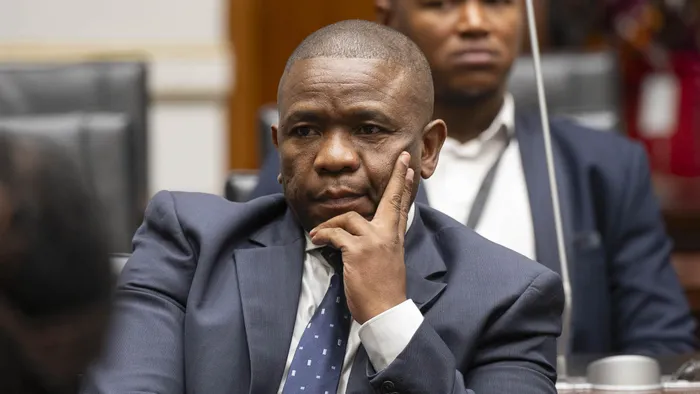ICYMI: 10 key highlights from Mkhwanazi’s testimony on SAPS corruption

Lieutenant-General Nhlanhla Mkhwanazi’s explosive testimony in Parliament linked senior police officials, political figures, and rogue operatives to efforts aimed at derailing SAPS corruption probes and seizing control of intelligence structures.
Image: Armand Hough
Parliament’s Ad Hoc Committee on Police Corruption heard testimony from KwaZulu-Natal Police Commissioner, Lieutenant-General Nhlanhla Mkhwanazi, on Tuesday and again on Wednesday, as he delivered a scathing account of political interference, criminal infiltration, and internal sabotage within the South African Police Service (SAPS).
The hearings follow the controversial disbandment of the Political Killings Task Team (PKTT) in KwaZulu-Natal, a move Mkhwanazi described as unlawful and politically motivated.
The committee reconvened on Wednesday for a second day of testimony, with MPs expected to begin direct questioning.
The inquiry was established to investigate allegations of political interference, leadership failures, and internal dysfunction in SAPS, with a particular focus on claims first raised by Mkhwanazi on 6 July in a press conference.
Here are ten of the most striking revelations from his testimony:
1. Minister’s Directive “Broke the Law”
Mkhwanazi told MPs that Police Minister Senzo Mchunu’s 31 December 2024 directive to dissolve the PKTT was irregular and “bordered on breaking the law.” He said the instruction intruded on the operational independence of the police, a domain constitutionally reserved for the National Commissioner.
“The Minister’s letter went beyond policy; it dictated operations, which is unlawful,” he said.
2. A Mysterious Hand Behind the Directive
The general revealed a “back-and-forth of letters” surrounding the controversial instruction and suggested that someone outside SAPS may have influenced or even drafted it. A criminal investigation is reportedly tracking WhatsApp and email communications between Minister Mchunu and his Chief of Staff, Cedrick Nkabinde.
3. “Someone Close to the Minister” Involved
Pressed by MPs, Mkhwanazi alleged that a person “linked to the Minister and within SAPS structures” played a role in shaping the directive. He declined to name the individual but said the person had “direct access to decision-making” at the ministerial level.
However, Mkhwanazi said he did not believe Minister Mchunu was the actual author of the letter that disbanded the elite task team investigating political killings.
4. Brown Mogotsi and General Feroz Khan Connection
Mkhwanazi said he requested a meeting with Minister Mchunu, National Commissioner Fannie Masemola, and two controversial figures: Brown Mogotsi and General Feroz Khan. He described them as influential actors with access to confidential SAPS material who blurred the line between political directives and operational policing.
5. “I Can’t Guarantee My Family’s Safety”
The commissioner told MPs he could not personally guarantee the safety of his family.
“Their safety is equal to that of every citizen. I can’t afford bodyguards for my family,” he said, adding that only “a functional, honest police service” could ensure protection for all.
6. Corruption Inside the Presidency
When asked about the relocation of the State Security Agency (SSA) to the Presidency, Mkhwanazi said corruption persisted regardless of its location.
“If they are bad outside, they will be bad inside,” he said, alleging that money was still being stolen within the SSA. His comments raise renewed concerns about accountability within South Africa’s intelligence structures.
7. The “Big Five” Corruption Ring
The commissioner named two figures, Vusimuzi “Cat” Matlala and Katiso Molefe, as part of a “Big Five” network allegedly driving corruption within SAPS and beyond. He said the remaining three members were “tender-linked businessmen whose names are known” but could not be publicly disclosed due to ongoing investigations.
8. DA MP Accused of Endangering Operatives
Mkhwanazi accused Democratic Alliance MP Dianne Kohler Barnard of compromising intelligence operations by publishing photos of covert Crime Intelligence properties. He said this endangered undercover officers and exposed safe houses.
He also implicated National Coloured Congress MP Fadiel Adams in mishandling sensitive crime intelligence material.
9. Rogue Section Inside the Investigative Directorate
He warned that the Investigating Directorate Against Corruption (IDAC) had been infiltrated by a “rogue faction” interfering in politically sensitive cases. He alleged that some officials, including senior investigator Brian Padayachee, were “used as pawns” to derail corruption investigations.
“IDAC lost the plot,” he said.
10. The Arrest of General Khumalo Was a “Project”
Mkhwanazi also described the arrest of Divisional Commissioner in Crime Intelligence, Lieutenant-General Dumisani Khumalo, as part of a coordinated campaign to halt high-level drug and organised crime investigations in Gauteng.
“This was no coincidence, it was a project,” he told MPs, claiming it formed part of a counter-intelligence operation by those seeking to regain control of SAPS intelligence resources.
hope.ntanzi@iol.co.za
IOL Politics
Get your news on the go. Download the latest IOL App for Android and IOS now.
Related Topics: